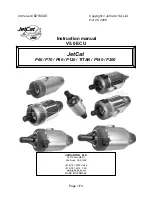
Section 3 - On The Water
Page 34
90-8M0053363
eng
NOVEMBER 2010
Safe Boating Suggestions
To enjoy the water safely, you should know and understand all boating regulations and restrictions that pertain to your activity.
Know and obey all nautical rules and laws of the waterways.
Boat operators should complete a boating safety course.
In the US, courses are offered by:
•
The US Coast Guard Auxiliary
•
The Power Squadron
•
The Red Cross
•
Your state or provincial boating law enforcement agency
Direct all inquiries to the Boat U.S. Foundation at 1‑800‑336‑BOAT (2628), or the US Coast Guard at 1‑202‑372‑1067.
Additional information about boating education and safe boating practices is available on the following web sites:
•
US Coast Guard Boating Safety Web Site: http://www.uscgboating.org/
•
US Coast Guard Auxiliary: http://nws.cgaux.org/
•
US Power Squadrons: http://www.usps.org
•
Boat US: http://www.boatus.com
Perform safety checks and required maintenance.
Follow a regular schedule and ensure that all repairs are properly made.
Check for onboard safety equipment.
We suggest the following:
•
Approved fire extinguishers
•
Signal devices (flashlight, rockets or flares, flag, and a whistle or horn)
•
Spare operating equipment (batteries, bulbs, fuses, etc.)
•
Tools necessary for minor repairs
•
An anchor and extra anchor line
•
A manual bilge pump and extra drain plugs
•
A supply of drinking water
•
A transistor radio.
•
Paddles or oars
•
A spare propeller, spare thrust hubs, and an appropriate wrench
•
A first aid kit and first aid instructions
•
Waterproof storage containers
•
A compass and appropriate maps or charts
Watch for signs of weather change.
Avoid foul weather and rough‑sea boating.
Tell someone where you are going and when you expect to return. Board cautiously.
Stop the engine whenever passengers are boarding, unloading, or are near the rear of the boat. Operating in neutral is not
sufficient.
Train emergency boat operators.
Instruct at least one other person onboard in the basics of starting and operating the power package and boat handling in case
the driver becomes disabled or falls overboard.
Do not overload your boat.
Most boats are rated and certified for a maximum load capacity. Know your boat’s loading limitations (refer to the boat capacity
plate). If in doubt, contact your dealer or the boat's manufacturer.
Never boat under the influence of alcohol or drugs.
It is illegal to operate a boat under the influence of drugs or alcohol. Alcohol or drug use will impair your judgment and drastically
reduce your ability to react quickly.
Make sure that everyone in the boat is properly seated.
Do not allow anyone to sit or ride inappropriately on any part of the boat. Inappropriate riding locations include seatbacks, gunwales,
the transom, the bow, decks, raised fishing seats, any rotating fishing seat, or anywhere that sudden acceleration, stopping, loss
of boat control, or other movement could throw a person into the boat or overboard.
Wear a personal flotation device (PFD) at all times while in the boat.
Содержание Axius 350
Страница 4: ......
Страница 82: ...Section 3 On The Water Notes Page 74 90 8M0053363 eng NOVEMBER 2010 ...
Страница 122: ...Section 5 Maintenance Notes Page 114 90 8M0053363 eng NOVEMBER 2010 ...
Страница 138: ...Section 6 Storage Notes Page 130 90 8M0053363 eng NOVEMBER 2010 ...
















































